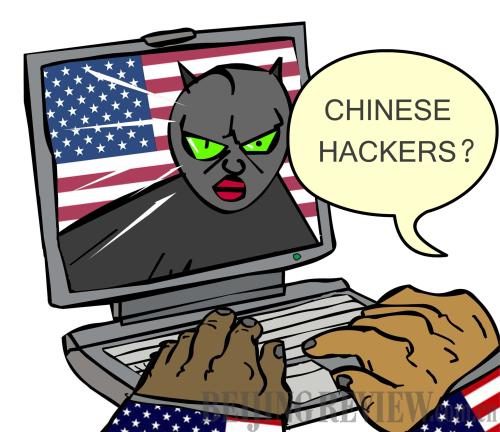|
 |
|
(LI SHIGONG) |
The United States has recently ratcheted up pressure on China for its alleged involvement in hacking. U.S. President Barack Obama said on March 12 that the United States expects China and other countries to "follow international norms" in cyber space. It was the first time the U.S. president publicly accused China of posing cyber security threats, pushing allegations of a Chinese cyber threat to a new high.
One day before, U.S. National Security Advisor Thomas Donilon claimed that "U.S. businesses have been increasingly concerned about the targeted theft of confidential business information and proprietary technologies through cyber intrusions emanating from China." In February, U.S. computer security firm Mandiant Corp. reported that a group attached to the Chinese military had stolen data from more than 140 companies and government agencies, most of which were in the United States.
Unwarranted charges
The Chinese Government has rejected the U.S. accusations. Foreign Ministry spokeswoman Hua Chunying said the Chinese Government attaches great importance to Internet security, and firmly opposes and combats cyber attacks in accordance with the law. "What cyber space needs is not war, but rules and cooperation," she said. China's Ministry of National Defense also said the Chinese military has never supported hacking activities.
On March 17, in his first press conference as the Chinese premier, Li Keqiang said online hacking is a worldwide problem and China is one of the major targets of hacker attacks. The country does not support—and indeed opposes—such attacks, he said. The premier rejected accusations of hacking against the United States, calling them a "presumption of guilt." He suggested the two countries should not make groundless accusations against each other but spend more time doing practical things that will contribute to cyber security.
Official statistics show that the websites of the Chinese Ministry of Defense and the China Military Online suffered 144,000 cyber attacks monthly on average in 2012, totaling 1.73 million a year, of which 62.9 percent came from Internet addresses in the United States. In the first two months this year, 2,194 U.S.-based servers were found to have attacked and controlled nearly 1.29 million computers in China, and more than 3,500 Chinese websites were attacked by hackers using U.S. Internet addresses.
The Internet is borderless, allowing hackers to hide their identity. It is difficult to locate the ultimate source of hacking activities due to the transnational and anonymous nature of cyber attacks. Chinese analyses show that many hackers from other countries including China's neighbors prefer attacking U.S. websites via Chinese addresses.
Chinese scholars pointed out U.S. accusations of Chinese cyber attacks focus on two points: One is that they are backed by the military, with the collaboration of universities and Internet firms; the other is that Chinese hackers steal business secrets and illegally access e-mail accounts of U.S. dignitaries. All these charges are aimed at vilifying China and portraying the United States as a "victim of cyber attacks" as well as a "cyber space guardian." By undermining the online credibility and legitimacy of countries that are not its allies, the United States is seeking to take the moral high ground in cyber space.
Cyber security is a newly emerging international security problem, and it is playing a growing role in the national security strategy of the United States. On February 12, Obama released an executive order aimed at shoring up defenses for U.S. critical infrastructure vulnerable to cyber attacks. Its focus is to enable government agencies to share information about cyber security threats with operators of critical infrastructure, and work together to build and develop a practical framework for ensuring cyber security. On March 12, during a testimony to the U.S. Senate Select Committee on Intelligence, Director of National Intelligence James Clapper said for the first time that cyber attacks and cyber espionage had supplanted terrorism as the top security threat facing the United States.
In the meantime, the United States has considerably enhanced its cyber defense force. Keith Alexander, Commander of the U.S. military's Cyber Command, announced on March 12 that the U.S. military would create 40 new cyber warfare units, of which 13 would be responsible for launching attacks. "This defend-the-nation team is not a defensive team," Alexander said. "This is an offensive team."
The cyber army has now become a new military branch of the United States in addition to the army, the navy and the air force. The U.S. military admitted that there are 11,000 staff members serving in the U.S. Cyber Command. But the Foreign Policy magazine put the number at 53,000-58,000.
| 